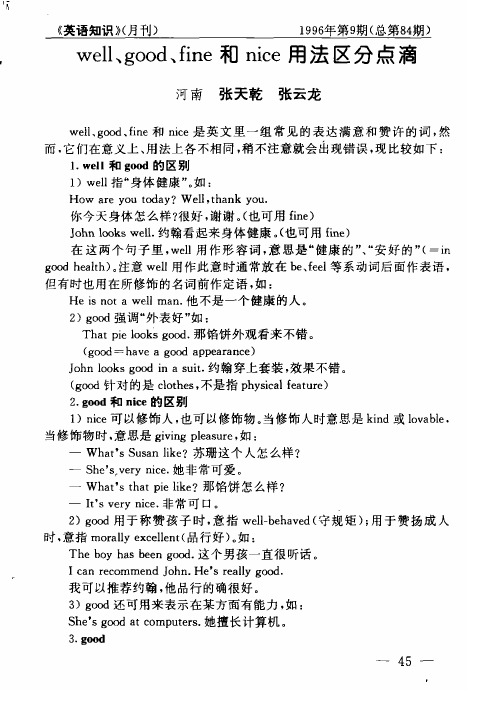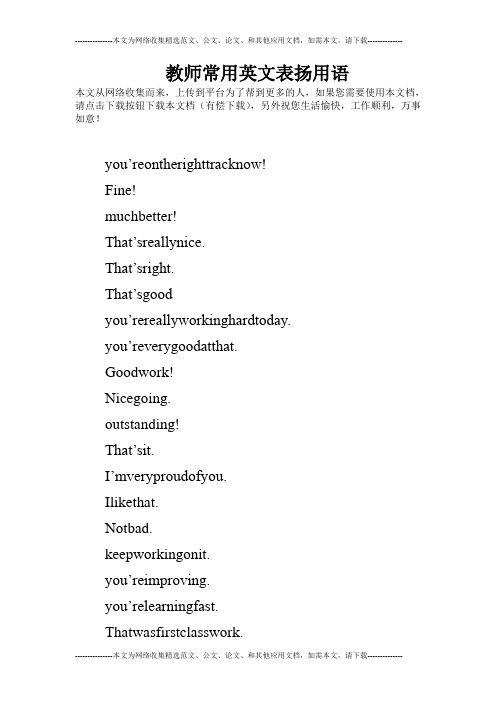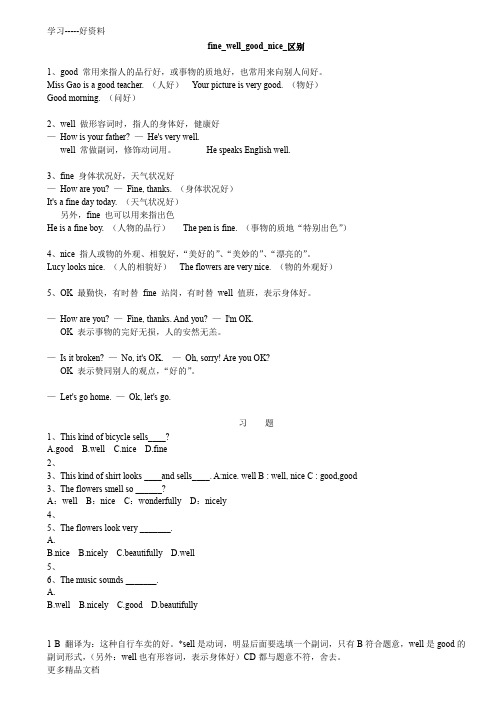good、nice、fine 用法
- 格式:doc
- 大小:20.00 KB
- 文档页数:1


英语中几个常见连词and,but,or的用法汇总◆and的六点用法◆(1) 表示联合,意为“和”、“又”、“而且”:We were cold and hungry. 我们饥寒交迫。
I woke up and got out of bed. 我醒了就起床了。
He played the piano and she sang. 他弹钢琴,她唱歌。
(2) 有时用于连接两个相同的词语,表示连续性:The train ran faster and faster. 火车开得越来越快。
We waited for hours and hours. 我们一直等了好几个小时。
The boys laughed and laughed. 这些孩子笑个不停。
【注】但有时连接两个相同名词表示不同的质量和种类:There are dictionaries and dictionaries. 词典很多,有好有坏。
Don’t worry—there are rules and rules. 别担心——规则与规则不一样。
(3) 在口语中用在come, go, run, stay, stop, try 等之后表示目的,大致相当于不定式符号to:Come and have tea with me. 过来跟我一起喝杯茶。
We ought to stop and think. 我们应该停下来想一想。
(4) 有时用在祈使句后,表示结果,意为“那么”:Work hard and you’ll succeed. 努力干吧,你会成功的。
Arrive late once more and you’re fired. 你再迟一次,你就会被开除。
比较:If you work hard, you’ll succeed. 如果你努力干,你会成功的。
(5) 有时表示对比(有类似but的意思):He is rich, and (yet) leads a modest life. 他很富有,但却过着朴素的生活。

教师常用英文表扬用语本文从网络收集而来,上传到平台为了帮到更多的人,如果您需要使用本文档,请点击下载按钮下载本文档(有偿下载),另外祝您生活愉快,工作顺利,万事如意!you’reontherighttracknow!Fine!muchbetter!That’sreallynice.That’sright.That’sgoodyou’rereallyworkinghardtoday.you’reverygoodatthat.Goodwork!Nicegoing.outstanding!That’sit.I’mveryproudofyou.Ilikethat.Notbad.keepworkingonit.you’reimproving.you’relearningfast.Thatwasfirstclasswork.Excellent.That’sthebestever.you’vejustaboutmasteredit.你就要掌握它了。
Perfect!完美无缺!youhaven’tmissedathing!一点不差!I’mhappytoseeyouworkinglikethat.我很高兴看到你像这样做。
That’smuch,muchbetter!这比以前好多了。
Exactlyright.完全正确。
you’redoingthatmuchbettertoday.你今天进步很大。
you’vejustaboutgotit.你就要答对了。
Iknewyoucoulddoit.我知道你是会的。
onemoretimeandyou’llhaveit.再来一次,你就会了。
Thatkindofworkmakesmehappy.真令我高兴。
Aren’tyouproudofyourself?难道还不为你自己感到骄傲?Goodthinking.好思路。
youarereallylearningalot.你真的学到了很多。
you’regettingbettereveryday.你每天都在进步。

课仁爱英语七年级上册unit1知识点+习题题Unit 1重点短语: good 好的;令人愉快的Ms. 女士morning 早晨;上午nice 令人愉快的;友好的afternoon 下午I 我meet 结识;遇见goodbye 再见am 是too 也;太;很bye 再见欢迎hi 喂fine 健康的;晴朗的to 到,对,向;在......之前and 和China 中国Mr.=Mister 先生OK 好,行thank 谢谢see 遇见;看到;明白here 在这里you 你;您;你们mom 妈妈the 这(那)个;这(那)些this 这,这个the USA 美国is 是the UK 英国my 我的hello 喂,你好teacher 老师are 是how 怎样yes 是,同意do 做no 不,不是;没有dad 爸爸not 不;没有Miss 女士,小姐重点语法:1.be动词的用法。
2. 一般疑问句及其回答。
重点句型: —仁爱英语七年级上册unit1知识点+习题——Nice to meet/see you.—This is my teacher, this is my mom.—How are you?Fine, thanks. And you?/I’m fine, thank you/ I’m OK.—See you later/ See you.—I’m KangKang.!—Miss Wang, this is Ms.Jone.—Are you Maria?重点详解:+地点名词:表示欢迎来到某地。
当对方用来表示欢迎时,常用Thank you. /Thanks.来回答。
例子:i!回答:Thank you. /Thanks.2. Nice to meet you.常用于(1)在两人初次见面经介绍后,(2)或者用于好久不见,偶然相逢时,回答:–Nice to meet you, too.区别:Nice to see you 用于熟人之间见面时候的礼貌用语。

词汇辨析:fine, nice, good, well本站原创| 2015-08-26分享到:四者都可用作形容词表示"好"之意,但前三者既可作表语又可作定语,而后者仅用作表语。
主要区别在于:(1) fine指物时表示的是质量上的"精细",形容人时表示的是"身体健康",也可以用来指"天气晴朗"。
例如:Your parents are very fine. 你父母身体很健康。
That's a fine machine.那是一台很好的机器It's a fine day for a walk today.今天是散步的好时候。
(2)nice主要侧重于人或物的外表,有"美好","漂亮"的意思,也可用于问候或赞扬别人。
例如:Lucy looks nice. 露西看上去很漂亮。
These coats are very nice. 那些裙子很好看。
Nice to meet you. 见到你很高兴。
It's very nice of you. 你真好。
(3)good形容人时指"品德好",形容物时指"质量好",是表示人或物各方面都好的普通用语。
例如:Her son is a good student. 她儿子是一个好学生。
The red car is very good. 那辆红色小汽车很好。
(4)well只可用来形容人的"身体好",但不能作定语,它也能用作副词作状语,多放在所修饰的动词之后。
例如:I'm very well, thanks. 我身体很好,谢谢。
My friends sing well. 我的朋友们歌唱得好。

fine_well_good_nice_区别1、good 常用来指人的品行好,或事物的质地好,也常用来向别人问好。
Miss Gao is a good teacher. (人好)Your picture is very good. (物好)Good morning. (问好)2、well 做形容词时,指人的身体好,健康好—How is your father? —He's very well.well 常做副词,修饰动词用。
He speaks English well.3、fine 身体状况好,天气状况好—How are you? —Fine, thanks. (身体状况好)It's a fine day today. (天气状况好)另外,fine 也可以用来指出色He is a fine boy. (人物的品行)The pen is fine. (事物的质地“特别出色”)4、nice 指人或物的外观、相貌好,“美好的”、“美妙的”、“漂亮的”。
Lucy looks nice. (人的相貌好)The flowers are very nice. (物的外观好)5、OK 最勤快,有时替fine 站岗,有时替well 值班,表示身体好。
—How are you? —Fine, thanks. And you? —I'm OK.OK 表示事物的完好无损,人的安然无羔。
—Is it broken? —No, it's OK. —Oh, sorry! Are you OK?OK 表示赞同别人的观点,“好的”。
—Let's go home. —Ok, let's go.习题1、This kind of bicycle sells____?A.goodB.wellC.niceD.fine2、3、This kind of shirt looks ____and sells____. A:nice. well B : well, nice C : good,good3、The flowers smell so ______?A:well B:nice C:wonderfully D:nicely4、5、The flowers look very _______.A.B.nice B.nicelyC.beautifullyD.well5、6、The music sounds _______.A.B.well B.nicelyC.goodD.beautifully1 B 翻译为:这种自行车卖的好。
初中英语300组常用词语辨析(3)§201grow / keep / raise / plantⅠ. grow & plant 都可表示“种植”如种植草、树、苗、花卉粮食等植物。
grow 着重指种植以后的栽培、管理过程。
plant 着重指“种植”这一行为。
某人plant a tree 之后,树是死是活,不一定管,但某人grow a tree 则包括培育管理,使其生长的过程。
如:① The students are planting trees on the hill. 学生们正在山坡上栽树。
(不用grow ) ② The farmer grows wheat in this field.那位农民在这块田里种植小麦。
(不用plant ) ③ People grow bananas in Hainan. 海南种植香蕉。
(不用plant )Ⅱ. keep 表“赡养”后可接表人或动物的名词,不用来代替plant 或grow. 如: He has a wife and three children to keep. 他要养活妻子和三个孩子。
Ⅲ. raise 除表“饲养(动物)”以外,还可表示“教育(子女)”; “培育(植物)”。
如: Where were you raised ? 你在哪儿长大?[注]:raise 强调从小精心培养到大,通常指培养花卉以及较难管理的植物。
如:Let ’s grow / raise some flowers in the garden.咱们在园子里种些花吧。
We grow rice, wheat and cotton in my hometown. 在家乡,我们种植水稻、小麦和棉花。
(不宜用raise )§202 glad/ happy/merry/ pleased 这组形容词都有:“高兴、快乐”之意。
Ⅰ.glad 多用在与人见面时的客套语中,指使人感到:情绪上有短暂的喜悦,常用作表语,一般情况下不作定语。
英语形容词的几种用法总结英语形容词的几种用法总结总结是对取得的成绩、存在的问题及得到的经验和教训等方面情况进行评价与描述的一种书面材料,它可使零星的、肤浅的、表面的感性认知上升到全面的、系统的、本质的理性认识上来,为此要我们写一份总结。
总结怎么写才不会千篇一律呢?下面是店铺收集整理的英语形容词的几种用法总结,欢迎阅读与收藏。
一、形容词作状语。
形容词作状语,通常是用于说明主语的情况,表示主语的状态、性质,特征等。
此时,形容词可位于句首、句末和句中,通常和句子其他部分用逗号分开,但单个形容词可以连在一起。
例:Strong, proud, and united, the people of St Petersburg are the modern heroes of Russia.坚强、自由与团结的圣彼得堡人民是俄国的现代英雄。
Curious, we looked around for other guests.由于好奇,我们环顾四周看看还有什么其他客人。
Kind and loyal, Tom is liked by the people around this area.由于对人和蔼与忠诚,汤姆很受周围人们的喜爱。
Practise:1.After 13-day flight in the Shenzhou 9 spaceship, three astronauts Jing Haipeng, Liu Wang, and Liu Yang returned to Earth .A. safely and soundlyB. safe and soundC. safety and soundD. safe and soundless答案:B 伴随状语,安危无恙。
2. Several hurs later, with the help of the police, the students managed to escape from the dangerous place, .A. hungrily and frighteningB. hungry and frightenedC. hungrily and frightenedD.hungry and frightening答案:B 排除AC,有副词3.When it was his turn to deliver his speech, , he walked towards the microphone.A. nervously and embarrassinglyB. nervous and embarrassedlyC. nervously and embarrassingD. nervous and embarrassed答案:D4. After visiting Expo 2012 Shanghai China, his parents returned with a lot of pictures, .A. tiredB. tiredlyC. tiringD. and tired答案:A5.—What has become of the ship?—It landed .A. safely but brokenB. safe but has brokenC. safely but was brokenD. safe but broken答案:D说明主语it的状况。
Starter Units 1-31.good adj.好的2.morning n.早晨;上午3.hi interj.(用于打招呼)嗨;喂4.hello interj.你好;喂5.afternoon n.下午6.evening n.晚上;傍晚7.how adv.怎样;如何8.are v.是9.you pron.你;你们10.I pron.我11.am v.是12.fine adj.健康的;美好的13.thanks interj.& n.感谢;谢谢14.OK adj.& adv.安然无恙15.what pron.& adj.什么16.is v.是17.this pron.这;这个18.in prep.(表示使用语言、材料等)用;以19.English n.英语adj.英格兰的;英语的in English 用英语20.map n.地图21.cup n.杯子22.ruler n.尺;直尺23.pen n.笔;钢笔24.orange n.橙子25.jacket n.夹克衫;短上衣26.key n.钥匙27.it pron.它28.a(an) art.(用于单数可数名词前,表示未曾提到的)一(人、事、物)29.that pron.那;那个30.spell v.用字母拼;拼写31.please interj.(用于客气地请求或吩咐)请32.33.the art.指已提到或易领会到的人或事物34.now adv.现在;目前35.see v.理解;明白36.can modal v.能;会37.say v.说;讲38.my pron.我的1.Good morning/afternoon/evening!早上/下午/晚上好!2.Hi,Bob!嗨,鲍勃!3.Hello,Eric!你好,埃里克!4.—How are you?你好吗?—I’m fine.Thanks.我很好。
谢谢。
5.—What’s this in English?这个用英语怎么说?—It’s an orange.它是orange。
well good nice fine的用法区别在日常英语交流中,"well"、"good"、"nice"和"fine"这几个词经常被用来表达肯定、满意或者赞许的情绪。
尽管它们都可以被翻译为“好的”,但是它们在语境和用法上却有着微妙的差别。
本文将详细探讨这四个词汇的用法区别,帮助您更准确地运用这些词汇。
一、Well1."Well"通常用作副词,表示程度或状态,有时也可以作为形容词。
例句1:She is a well-known author.(她是一位知名的作家。
)在这里,"well"作为形容词,表示“知名的”。
例句2:He did well in the exam.(他考试考得很好。
)在这里,"well"作为副词,表示“很好地”。
2."Well"还可以用于表达惊讶、失望或者犹豫的情绪。
例句:Well, I didn"t expect that to happen.(哦,我没想到会发生那样的事。
)二、Good1."Good"通常用作形容词,表示质量好、令人满意或者有道德的。
例句1:This is a good book.(这是一本好书。
)例句2:She is a good teacher.(她是一位好老师。
)2."Good"还可以用于回答别人的问候。
例句:How are you? —— I"m good, thank you.(你好吗?——我很好,谢谢。
)三、Nice1."Nice"也是形容词,表示令人愉悦、友好或者美观的。
例句1:She has a nice smile.(她有一个好看的微笑。
)例句2:It"s nice to meet you.(很高兴见到你。
good 、fine 、nice 、excellent
1、The juice is still dood 。
这瓶果汁还是好的。
2、She is fine wtiter。
她是一位杰出的作家。
3、Y ou gets a nice salary。
你的薪金真高。
4、He is an cxcellent football player。
他是一名优秀的球员。
fine 指外在美观,内在质量优秀精细,常修饰天气、景色、气色、质量、成绩、技术、学问、相貌等。
a fine idea 好主意,a fine day 晴天,a fine place 景色佳的地方。
good 指一切好的东西,但不强调外在的精美,而强调内在的优良,a dood boy 好男孩,good news 好消息,good English 地道的英语,nice 指能给人以良好的印象,使人觉得愉快的东西,带有主观的色彩。
This soup tastes very nice。
这道汤尝起来很好。
excellent 指“优秀的、良好的”,无比较级和最高级。
一般只用于肯定句,不用于否定句、疑问句和条件句。